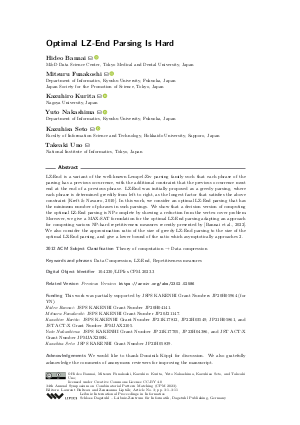@InProceedings{bannai_et_al:LIPIcs.CPM.2023.3,
author = {Bannai, Hideo and Funakoshi, Mitsuru and Kurita, Kazuhiro and Nakashima, Yuto and Seto, Kazuhisa and Uno, Takeaki},
title = {{Optimal LZ-End Parsing Is Hard}},
booktitle = {34th Annual Symposium on Combinatorial Pattern Matching (CPM 2023)},
pages = {3:1--3:11},
series = {Leibniz International Proceedings in Informatics (LIPIcs)},
ISBN = {978-3-95977-276-1},
ISSN = {1868-8969},
year = {2023},
volume = {259},
editor = {Bulteau, Laurent and Lipt\'{a}k, Zsuzsanna},
publisher = {Schloss Dagstuhl -- Leibniz-Zentrum f{\"u}r Informatik},
address = {Dagstuhl, Germany},
URL = {https://drops.dagstuhl.de/entities/document/10.4230/LIPIcs.CPM.2023.3},
URN = {urn:nbn:de:0030-drops-179571},
doi = {10.4230/LIPIcs.CPM.2023.3},
annote = {Keywords: Data Compression, LZ-End, Repetitiveness measures}
}

 Creative Commons Attribution 4.0 International license
Creative Commons Attribution 4.0 International license

